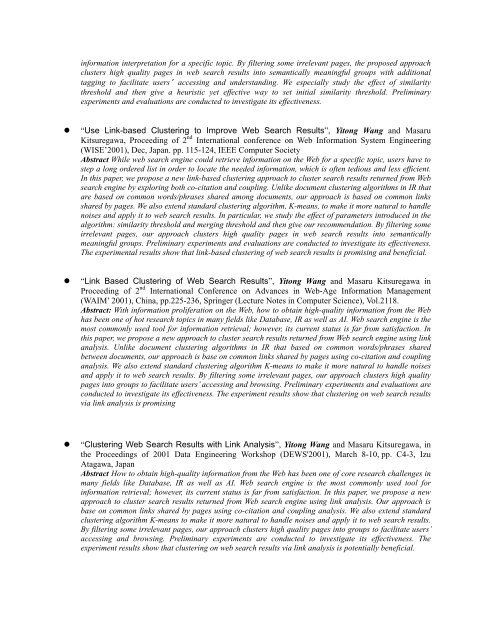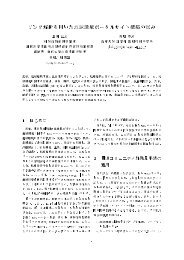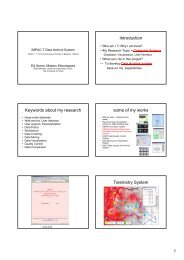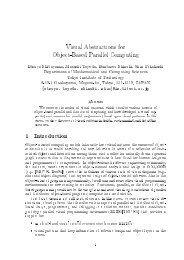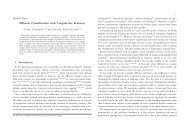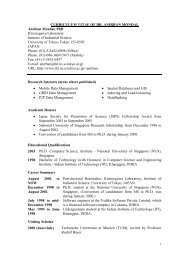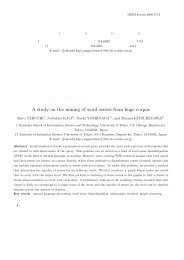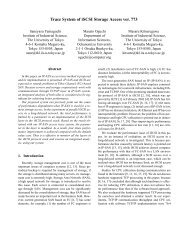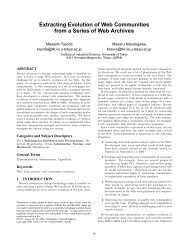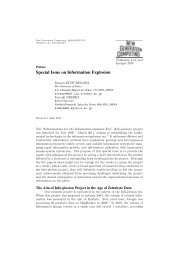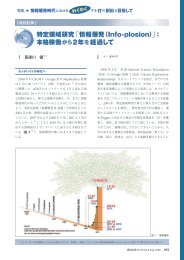Selected Publications
Selected Publications
Selected Publications
Create successful ePaper yourself
Turn your PDF publications into a flip-book with our unique Google optimized e-Paper software.
information interpretation for a specific topic. By filtering some irrelevant pages, the proposed approachclusters high quality pages in web search results into semantically meaningful groups with additionaltagging to facilitate usersaccessing and understanding. We especially study the effect of similaritythreshold and then give a heuristic yet effective way to set initial similarity threshold. Preliminaryexperiments and evaluations are conducted to investigate its effectiveness.• “Use Link-based Clustering to Improve Web Search Results”, Yitong Wang and MasaruKitsuregawa, Proceeding of 2 nd International conference on Web Information System Engineering(WISE’2001), Dec, Japan. pp. 115-124, IEEE Computer SocietyAbstract While web search engine could retrieve information on the Web for a specific topic, users have tostep a long ordered list in order to locate the needed information, which is often tedious and less efficient.In this paper, we propose a new link-based clustering approach to cluster search results returned from Websearch engine by exploring both co-citation and coupling. Unlike document clustering algorithms in IR thatare based on common words/phrases shared among documents, our approach is based on common linksshared by pages. We also extend standard clustering algorithm, K-means, to make it more natural to handlenoises and apply it to web search results. In particular, we study the effect of parameters introduced in thealgorithm: similarity threshold and merging threshold and then give our recommendation. By filtering someirrelevant pages, our approach clusters high quality pages in web search results into semanticallymeaningful groups. Preliminary experiments and evaluations are conducted to investigate its effectiveness.The experimental results show that link-based clustering of web search results is promising and beneficial.• “Link Based Clustering of Web Search Results”, Yitong Wang and Masaru Kitsuregawa inProceeding of 2 nd International Conference on Advances in Web-Age Information Management(WAIM’ 2001), China, pp.225-236, Springer (Lecture Notes in Computer Science), Vol.2118.Abstract: With information proliferation on the Web, how to obtain high-quality information from the Webhas been one of hot research topics in many fields like Database, IR as well as AI. Web search engine is themost commonly used tool for information retrieval; however, its current status is far from satisfaction. Inthis paper, we propose a new approach to cluster search results returned from Web search engine using linkanalysis. Unlike document clustering algorithms in IR that based on common words/phrases sharedbetween documents, our approach is base on common links shared by pages using co-citation and couplinganalysis. We also extend standard clustering algorithm K-means to make it more natural to handle noisesand apply it to web search results. By filtering some irrelevant pages, our approach clusters high qualitypages into groups to facilitate users’ accessing and browsing. Preliminary experiments and evaluations areconducted to investigate its effectiveness. The experiment results show that clustering on web search resultsvia link analysis is promising• “Clustering Web Search Results with Link Analysis”, Yitong Wang and Masaru Kitsuregawa, inthe Proceedings of 2001 Data Engineering Workshop (DEWS'2001), March 8-10, pp. C4-3, IzuAtagawa, JapanAbstract How to obtain high-quality information from the Web has been one of core research challenges inmany fields like Database, IR as well as AI. Web search engine is the most commonly used tool forinformation retrieval; however, its current status is far from satisfaction. In this paper, we propose a newapproach to cluster search results returned from Web search engine using link analysis. Our approach isbase on common links shared by pages using co-citation and coupling analysis. We also extend standardclustering algorithm K-means to make it more natural to handle noises and apply it to web search results.By filtering some irrelevant pages, our approach clusters high quality pages into groups to facilitate users’accessing and browsing. Preliminary experiments are conducted to investigate its effectiveness. Theexperiment results show that clustering on web search results via link analysis is potentially beneficial.


